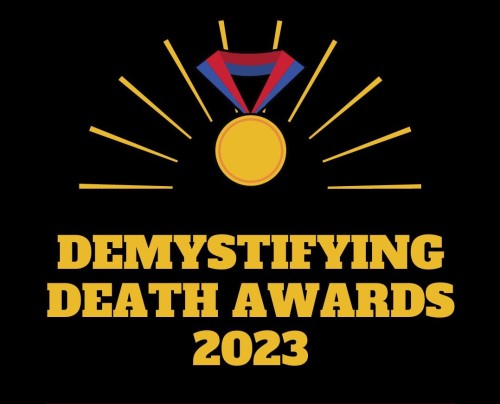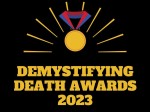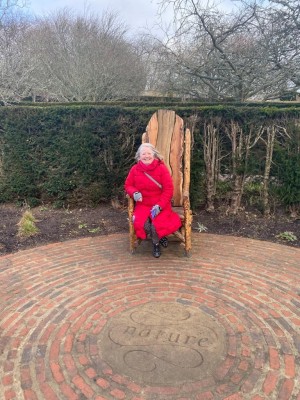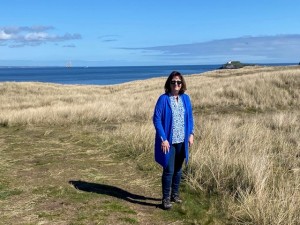Demystifying Death Awards 2023

We're delighted to announce the shortlist for this year's Demystifying Death Awards, recognising pioneering work that shines a light on death, dying and bereavement in Scotland.
The Awards celebrate those working to make Scotland a place where everyone can help when someone is caring, dying and grieving. Find out more about about the work of the shortlisted candidates below.
Progressive Policy Shortlist - Childhood Bereavement Network: Cohabiting Parents and Bereavement Benefits Campaign

After more than a decade of campaigning, a recent win for the Childhood Bereavement Network and many partner organisations has seen eligibility to bereavement benefits extended, meaning cohabiting parents and their children can now get financial support.
Parents with dependent children are entitled to bereavement payments worth almost £10,000 if their partner dies before the children grow up. These payments, made over 18 months, give families a bit of breathing space as they adjust to life without their mum or dad.
Entitlement is built up through the National Insurance (NI) contributions of the partner who died, in the same way that these contributions build up entitlement to other social insurance benefits such as the State Pension and certain unemployment allowances.
People make NI contributions at the same rate, whatever their relationship status. However, until recently, Bereavement Support Payment was only paid when the parents had been married or in a civil partnership. It was denied to families where the parents had been cohabiting without being married. That meant that around 1,800 grieving families a year faced the terrible double blow of one parent dying and then being denied state support. This injustice took on a new dimension during the pandemic, when so many weddings were postponed.
The impact of being denied these benefits is devastating, layering anxiety and shame on top of grief. One mum said
“Holding down a full-time job whilst looking after a young child with very little support is taking a toll on my mental health leaving little time for grieving, which then impacts on my child’s happiness. I had to sell my house as a result. I feel naïve as I didn’t realise that not being married meant that my child was treated as if they were lesser than children of married parents. This guilt is difficult to handle.”
Now, thanks to a dedicated campaign by many organisations and individuals, coordinated by the Childhood Bereavement Network, cohabiting couples are entitled to the benefit. From 9 February 2023, newly bereaved families have been able to claim. Very unusually, the Government is also making retrospective payments back to August 2018 when the Supreme Court found the eligibility rules to be incompatible with Human Rights legislation.

Getting to this point has involved the full playbook of public campaigning, strategic litigation, parliamentary lobbying and working with officials. Since 2011, the Childhood Bereavement Network has co-ordinated activity to try and influence the government to make this change, through proposing amendments to legislation, meeting with ministers and officials, and gathering and analysing evidence for the Work and Pensions Select Committee and individual MPs including Sir Ed Davey and Stella Creasy.
Key to all of this has been the tireless work of parent campaigners, particularly Georgia Elms and Vicky Anning at WAY Widowed and Young, many of whose members have been affected by this injustice. Parents Siobhan McLaughlin, Kevin Simpson and James Jackson were brave enough to appeal the decisions to deny benefits to them and their children – their court victories paved the way for change. Laura Rudd set up a public petition that quickly gathered over 100,000 signatures from people calling for the rules to be amended.
Many organisations have backed the campaign, signing joint letters, endorsing briefings and sharing ideas and insights to help design the changes: the Scottish Partnership for Palliative Care, One Parent Families Scotland and Child Poverty Action Group Scotland, to name but a few. As will be clear, a huge number of people have been instrumental to this change. You can read the thank-yous in this twitter thread.
However, the work doesn’t stop here. While some people have had a straightforward experience of making a retrospective claim since February, and have already received their payment, others (particularly those bereaved longer ago) have struggled to get the information they need about what implications a claim might have on their wider tax and benefits entitlement. We are pressing DWP to improve their communications with potential claimants before, during and after they put in a claim. We also have much work to do to fund the 21,000 families who could be in line for a back payment.
We are also sharing our insights with those campaigning for justice for bereaved people who are still ineligible, including surviving partners without children, and those whose partner was too sick or disabled to build up the necessary NI contributions. It’s crucial that this lifeline support is extended to all those who should be protected at a time of great stress and grief.
For more information, visit www.childhoodbereavementnetwork.org.uk/cohabiting
Read about the other Demystifying Death Award nominees here: Demystifying Death Awards Blogs
Progressive Policy Winner - The Funeral Support Payment by Social Security Scotland

Social Security Scotland has pledged to administer payments and benefits with dignity, fairness and respect. Nowhere is this more important than with Funeral Support Payment, which offers help to people during some of their most difficult days.
Specially trained advisors help eligible clients get the support they need. Introduced in 2019, Funeral Support Payment comes in three parts. The first covers the cost of burial or cremation. The second component covers the standard rate of £1,178.75 for other expenses for most clients or £143.85 if the person who died had a pre-paid funeral plan. The third covers other costs including travel expenses incurred by the clients, transport cost to transfer the body of the deceased and some document costs and medical costs.
Clients are eligible for Funeral Support Payment if they or their partner live in Scotland, get a qualifying benefit or payment and are arranging and paying for the funeral of someone who lived in the UK. Applications must be made within six months of the person dying. In most cases the person making the application will be a close relative, but they don’t have to be. Before applying, clients should register the death of the deceased person and check whether they might be eligible. They may want to inform their funeral director though this is not a requirement.
Applications can be made online via the mygov.scot website, by post, over the phone or in person.
It’s important for Social Security Scotland to make sure as many eligible people as possible are receiving Funeral Support Payment. This year we have embarked on a marketing campaign to increase awareness of the payment. You may have seen our posters advertising Funeral Support Payment on hundreds of phone kiosks across Scotland during the campaign which ran from January until April. There were also adverts running on radio and on digital channels.
Our most recently published statistics show that take-up – the percentage of those eligible successfully applying for the payment - was 66%. That represented a rise on the previous year but there is still work to be done to make sure that more of those eligible can apply successfully. That means a total of £32.5 million worth of support since the payment was introduced until the end of December 2022.
In December last year the then Minister for Social Security Ben Macpherson visited Scotmid Funerals and discussed better engagement between Social Security Scotland and the industry.
We have also been talking to other industry bodies and stakeholders as we continue our efforts to drive take-up forward.
As well as Funeral Support Payment, Social Security Scotland operates a bereavement service of specially trained client advisers provided help to people who have to report a death and need to update us. With just one phone call, people can report the death of a family member, friend or loved one directly to an expert adviser. At that point, our adviser will take the necessary information for all payments that need to be cancelled.
Social Security Scotland is delighted to be a part of the Demystifying Death awards and working with the Scottish Partnership for Palliative Care.
Read about the other Demystifying Death Award nominees here: Demystifying Death Awards Blogs
Inspiring Community Shortlist - No One Dies Alone Ayrshire (NODA)

We are a registered charity made up of compassionate volunteer companions who kindly volunteer their time to sit with people who are dying in their final hours. Our volunteers provide companionship and a listening ear to anyone who needs support to ensure no-one is left feeling alone or isolated. We also work with those who have families who need a break or some support, and offer them help laying their loved one out at home if they wish to do so. We run two local bereavement support groups and offer one to one bereavement support.
We have a new project called Sandy's Toolbox which offers a crisis care package of practical items for families who need them such as wipes, pads, mouth swabs etc. The toolboxes also come with some leaflets on how to do a bed bath for families who find themselves suddenly in that position.

Our ethos is to make a difference in the local community by training, empowering, and supporting members of the community to help each other at the end of life. We are working at many different levels to instigate this change and are part of the progressive death movement currently sweeping the nation, bringing back a sense of care and naturalness to death, dying and grieving.
Our volunteers are ordinary members of the public, but many are also professionals including nurses, ex nurses and others from the care sector who know how much our service is needed. We continue to use their invaluable feedback to adapt our

training and improve our services. We also encourage our volunteers’ continuous self-development and provide clinical supervision and peer support for our staff and volunteers.
We are the first project of this kind set up in Ayrshire and have been up and running since October 2018. We received our charitable status in October 2019 and continue to go from strength to strength as we gain more volunteers and supporters.
Our volunteers now number 43 and we have 5 board members. We have ongoing recruitment and training as these numbers increase.
Find out more at NODA's website.
Read about the other Demystifying Death Award nominees here: Demystifying Death Awards Blogs
Inspiring Community Winner - Pushing Up the Daisies

The last couple of months have been busy ones for Pushing Up the Daisies. We’ve just finished our ninth online After the Last Breath course, meeting with kindred spirits from all over Scotland and beyond at the live sessions held every three weeks. We will be running the course again in the autumn. Just as the course came to an end we launched on our website a modular version of it for those who prefer to learn on their own and at their own pace.
The members of our Daisy Chain are volunteers who have completed the online course and can give people guidance on their options when someone dies and share their local knowledge, for example of burial grounds,

crematoria and funeral directors. They meet with people individually to do this and also hold ‘Round The Kitchen Table Sessions’. Someone who supports the work of Pushing Up the Daisies invites friends to come to their home for a few hours. The Daisy Chain member introduces what is possible during what we call the ‘Daisy Days’ - the time between a person’s death and their burial or cremation. The person hosting the session provides cake, and possibly also soup, to fuel conversation, and those attending go away with new ideas to discuss with their families and friends. If you would like to host a Round the Kitchen Table session, get in touch through our website and we will connect you to a local Daisy Chain member.
Daisy Chain members get together once a month at lunchtime for the Daisy Diner. Here they can catch up with other members and review a topic. This month the discussion was about the additional stresses on everyone involved when someone dies unexpectedly. Did you know that medical staff and police have particular procedures to follow when a death is unexpected? This can mean that relatives and friends are not able to see the person, or have access to the place where they died, for several days. Being aware of this may not make it any easier to deal with, but it may help people to be better prepared to look after themselves if it should happen.
Hot off the press this month is a book, ‘Slow Down When Someone Dies', written by two of our trustees, Kate Clark and Lin Carruthers. Lin and Kate are making plans to speak about the book and the work of Pushing Up the Daisies during Demystifying Death Week. They will meet with people in Dundee, Helensburgh, Irvine, East Kilbride, Edinburgh and more. “Because we are a national charity, much of our contact with people is, of necessity, online and it is wonderful to have the chance to meet people in person. We are really looking forward to it,” they say. Maybe they will see you there!
Find out more at PUD's website and Facebook page.
Read about the other Demystifying Death Award nominees here: Demystifying Death Awards Blogs
Inspiring Community Shortlist - North Berwick Compassionate Community

Hello, this is Fiona and Deborah. We are volunteers and founding members of the North Berwick Compassionate Community. We thought you might be interested in our experience of creating a Compassionate Community. You might be thinking about creating your own Compassionate Community? If so we can share with you the development of our project, our successes and challenges. And we can also share all the things we had wished we had known before we started!
We had started in 2015 with annual events for Absent Friends week. The first event was a coffee morning showing the film ‘Seven Songs for a Long Life’ that explored the intimate lives of patients and staff at Strathcarron Hospice, and directed by Amy Hardie. It is an uplifting film and touched many of the people who attended. The film generated lots of discussion and we put ‘death café’ questions on the tables. But we didn’t call it a death café. I think at the time we were anxious about whether this would put people off attending. Over the next few years we continued to hold events. Our most successful event was when we included lots of local organisations in the day. The local choir sang appropriate songs. The local writing group wrote pieces and performed them for us. And the floral art group made a memory tree for people to hang the names of loved ones who had died.

In 2019 we became aware of the Truacanta Project and considered applying to be one of the five Compassionate Communities in Scotland. We were ambivalent about applying at first. Mostly concerned how much work it would involve and whether we had enough support. We decided to hold a public meeting before the annual Absent Friends event. We said that we wouldn’t go ahead if less than 30 people attended. And we were delighted (but wary!) when over 30 people helped us to create a vision for the project. We decided to have a ‘Big Conversation’ thread to have the conversations at local events as a way of increasing confidence about talking about death, dying and grief. The second thread was the ‘Support’ thread that would aim to offer support by local people to individuals and families who were facing a terminal diagnosis or bereavement. We were hesitant about offering support as volunteers to people at a vulnerable time in their lives. We were also anxious about managing the volunteers and disclosure and safe guarding etc.
We were delighted to be chosen as one of the Compassionate Communities. And then along came COVID and lockdowns……
After our initial concern about how we could proceed we developed regular ‘Armchair chats’ on Zoom. Each online event has a theme linked to the ‘Compassionate Community’ ethos. Our events have grown creatively, with live, ‘light’ music, poetry readings and book excerpts from authors. The aim was to support live speaker discussion on some of the issues associated with death, dying, grief and loneliness. Engaging with the community during COVID required us to think creatively on how to sensitively have Big Conversations during a national and global crisis. We found combining the conversation with uplifting activities such as music and poetry worked well. Between 25-40 people signed up for each session. We also had a book group at Fringe by the Sea. This all culminated in a Big Conversation event at our local Fringe by the Sea with Kathryn Mannix and Richard Holloway and attended by over 130 people. As the format of a singer and music worked for our zoom events we felt it was important to include singer at the big event. One of the most touching moments was when the BSL signer for people who are deaf signed and danced to the music. It was one of the most beautiful things we have ever experienced. We also learned that day the importance of the ripples of conversations that can occur after such an event. People want to share their stories.

The support thread of the project has been more challenging. We partnered with St Columba’s Hospice to create a group of Compassionate Neighbours for North Berwick. We provided the EASE (End of Life Aid Skills for Everyone) course locally. We now have three EASE volunteer facilitators and we have delivered the course to over 75 people. We run the course twice a year.
In 2022 we collaborated with a local organisation North Berwick Coastal Community Connections to employ a paid coordinator for ten hours a week to develop the Compassionate Neighbours locally. Piggy backing on other organisations has been one way that local volunteers can further develop the support part of the work. We have had many successes during this time and have supported four people and families at the end of life. It was such an honour to walk alongside at this time of their lives.
There has been lots of learning through this process and initially we thought we could have a local Compassionate Neighbour programme but have now decided to stay with St Columba’s Hospice, as part of their team of Compassionate Neighbours. To develop a local service takes time, networking, support and more time is required. We will continue with the local conversation events. Our hunch is that our local community requires more time to develop confidence to support people. Many of the people who undertook the EASE training were more interested in developing skills to support their own families and friends. We have learned and value more the benefits of the ‘small conversations’ that can enhance people’s confidence and resilience.
Our learning is that it takes many baby steps and we do remind ourselves of why we believe this work is important. Death and dying and grief are probably one of the last social taboo, so it takes a lot resilience to keep going. At the same time it is life affirming and the ‘small conversations’ feel so important.